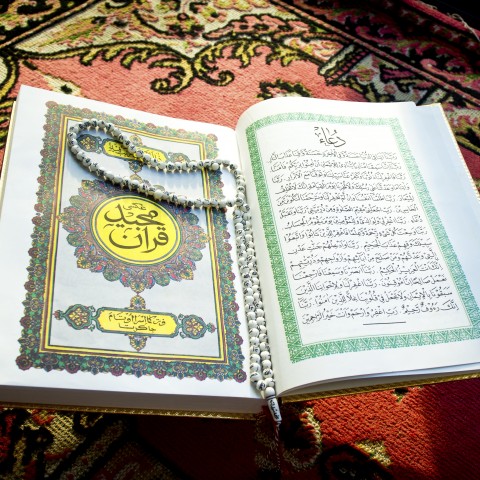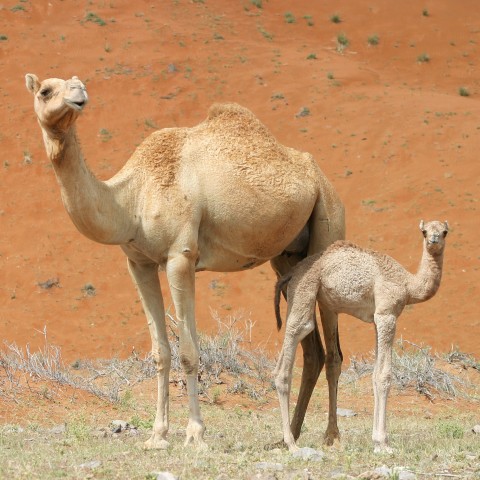
Before too long in your Arabic studies, people are going to ask you a simple question:
“Which dialect are you going for?“
Well, it sounds simple. But there’s a lot under the surface. For example, how many different Arabic dialects are there? Where are they spoken, and where are they understood? Who teaches what dialects?
These questions don’t have easy answers. Learning more about this topic, though, will help you see a broader picture of Arab culture and history in general—and we’ll tell you up front that no matter which dialect you choose, you will be richer for it. Start with a bonus, and download the Must-Know Beginner Vocabulary PDF for FREE!(Logged-In Member Only)
 Table of Contents
Table of Contents
- An Overview of the Arabic Language, Part 1: Legal Recognition
- Dialects and Their Status
- Modern Standard Arabic
- Maghrebi (Moroccan) Arabic
- Egyptian Arabic
- Gulf Arabic
- Levantine Arabic
- How Much Do Native Speakers Understand?
- Which One is Best to Learn?
- Conclusion
1. An Overview of the Arabic Language, Part 1: Legal Recognition

Makes sense to start here, right? If a country adopts a language for its official use, it’s a good bet that it will be easy to learn about it.
Arabic is the only official language in fifteen different countries, including Egypt, Jordan, Libya, United Arab Emirates, Saudi Arabia, and Bahrain. It’s co-official in ten more, including Iraq, Tanzania, Algeria, Morocco, Sudan, and Somalia.
Arabic is also recognized as a minority language in Cyprus, Iran, Mali, Niger, Senegal, and Turkey; it’s given special status in several other countries, including Israel, Pakistan, and the Philippines.
Naturally, some of these places have more Arabic speakers than others—very few Filipinos or Turks end up fluent in Arabic. They all, however, contribute to the enormous tapestry of diverse Arabic dialects that exist throughout the world.
2. Dialects and Their Status
To put it briefly, Arabic speakers from different countries will often have a hard time understanding each other. The Arabic language dialects of different regions have diverged quite a lot.
However, the written Arabic language has remained mostly unchanged since its beginnings, in fact getting slightly simpler over time. In effect, there’s a huge difference between formal Arabic writing and casual Arabic speech, so much so that they can be called two separate languages.
The vast majority of written Arabic that you’ll encounter is going to be in Modern Standard Arabic, also called MSA. Only small bodies of literature, poetry, and songs are written in dialects.
The “big question” for Arabic learners is this: Dialect or MSA? Before we give you an answer, let’s take a closer look at the differences between Modern Standard Arabic vs. dialects.
3. Modern Standard Arabic

The Arabic MSA dialect is a slightly simplified version of the Classical Arabic used to write the Quran.
If you learn it exactly as prescribed by the strictest Arabic teachers, you’ll deal with a pretty staggering (for an English-speaker) number of consonants, case endings, grammatical agreements, and verb forms that don’t exist in the spoken languages anymore.
That’s right—it’s objectively much more complicated grammatically than all of the dialects.
MSA is very often described as “rigid.” That’s because, without any governing language body, native speakers of dialects are rarely taught that anything is right or wrong in their dialects, while in school, they’re constantly told by their teachers that they’re making mistakes.
Of course, the dialects have many rules, but the point is that they’re not as formalized as the rules of MSA.
Coming from no Arabic background, it may actually be slightly easier for you to learn MSA because you won’t have a perfectly formed dialect in your head leading you astray as you read and write.
4. Maghrebi (Moroccan) Arabic
Starting from the western part of the Arabic-speaking regions, we have Maghrebi Arabic, spoken in Morocco, Algeria, and Tunisia.
Many people consider this dialect to be the most divergent one by far, enough to make it very hard to understand for native speakers. Many speakers of other Arabic dialects even have a first reaction of “Is this really Arabic?”
In fact, this form of Arabic has many complex variations and accents within this region, so that one’s word choice might give away their origin even if they’re from the same larger geographic area. The most prestigious dialect in this region is the Moroccan Arabic dialect, and you can find resources for learning it online pretty easily.
What exactly makes it so hard? A lot of unstressed vowels simply get deleted, for one. This leads to consonant clusters that don’t show up in other dialects of Arabic. So for instance, the word for “sky” in MSA is samaa’, while in Maghrebi Arabic it’s sma.
Another reason is that there are a lot of French-derived loanwords in Maghrebi Arabic. The word for “cheese” is jobn in MSA, but formaj here (from the French fromage).
Anecdotally, some people from the Maghreb tend to be better at speaking MSA than, say, Egyptians. This is because they have to put in more effort to speak it than people who speak a widely understood colloquial dialect!
Most foreigners learning a Maghrebi dialect are doing so for travel, and so they’re probably interested in Morocco, as that’s the most touristic country in the region.
But even inside this dialect group, you’ll still find diversity. The word for “same,” ironically enough, is bhalbhal in Morocco but kifkif in Algeria!
5. Egyptian Arabic

Next we’ve got Egyptian Arabic. This one you’ve almost definitely heard of, since it’s by far the biggest cultural presence of any colloquial dialect.
That’s because Egypt is famous within the Arab world for its movies and TV. Seriously—that’s all it takes for your dialect to become famous.
Because of all the star power, it’s widely understood in the Arab world, and many people from other countries are able to make some changes to their speech to approximate the Arabic dialects in Egypt.
Perhaps the most obvious of these changes is the pronunciation of the letter ج, which is a “j” (as in “judge”) sound in most dialects, but a “g” (as in “gum”) in Egypt.
Egyptian Arabic is related to the Arabic Sudanese dialect, which doesn’t have the same prestige but still has more than thirty-million speakers. Sudanese Arabic keeps the original pronunciation of ج, and so some people say that it’s a little bit “clearer” for foreign learners.
6. Gulf Arabic

If you just look at the Arabian Gulf, you’ll see that it’s dominated by Saudi Arabia. But that doesn’t mean it’s dominated by just one dialect. Instead, there are multiple dialects of Gulf Arabic, too, divided roughly into north, south, east, west, and central dialects.
In general, the Arabic Gulf dialect isn’t as “prestigious” compared to the others. If you travel outside of the Gulf and speak it, you may end up sounding provincial. Even inside the geographic region, you’re likely to meet different dialect-speakers instead of people aiming for the dialect of the capital.
Some of the biggest differences are that the vowel combinations ow and ay are simply o and e respectively, and that ك makes a “ch” sound instead of a “k” sound.
We’ll include the Arabic Iraqi dialect here too, just because there are, unfortunately, relatively few resources available for learning about it. Broadly speaking, it’s a bit similar to Gulf Arabic, with a couple of small sound changes.
It’s pretty hard for an Egyptian- or Maghrebi-speaker to understand at first though, because it has a different cadence to it.
Iraqi Arabic has English loanwords in unexpected places, such as tire and brake which remain virtually unchanged from their English equivalents.
7. Levantine Arabic
“The Levant” is a region in the Eastern Mediterranean that roughly includes Syria, Jordan, Lebanon, Palestine, Israel, and Cyprus.
You might think that the name comes from “Lebanon,” but in fact, it comes from the same Latin root as “levitate,” referring to the sun rising in the sky. There’s also a large number of speakers from Lebanon, so it’s easy to get confused!
The Arabic Levantine dialect is probably one of the most-learned these days after Egyptian Arabic, because of the instability in that area forcing millions of refugees to travel to other countries. For example, most Arabic teachers in Europe are likely to be from that region.
If you’ve heard of “Syrian Arabic,” then you’ve heard of Levantine Arabic. This “prestige dialect” is sometimes taken to be that of Damascus, Syria’s capital.
Levantine Arabic, as one would expect from its location, has many loanwords from Turkish, Aramaic, and Hebrew. بوظة (boza), for instance, is a Turkish loan meaning “ice cream,” and شيروتيم (shirutim) means “toilets.”
As part of that area was under French control for some years following the First World War, some words from French have made it in as well, such as بلكون (balcon) for “balcony.”
Many people say that the sound system is softer and the grammatical system is easier than those in MSA.
The dual grammatical form, and some special tricks with the verbs in different positions, simply don’t exist in Levantine Arabic, letting legions of students sigh in relief. However, that means that native speakers have to work that much harder to learn those features of MSA!
8. How Much Do Native Speakers Understand?
This is a really interesting question that has a ton of different answers depending on who you’re talking to.
Some people maintain that these are totally separate languages, and others maintain that you can pick any of them up with enough exposure. Who’s right?
It all depends on your experience growing up. If you were the type of Arabic-speaker to have great MSA classes, friends from different regions, and an interest in TV shows from all over, it’s going to be far, far easier for you to understand new dialects than if none of those things were true.
There are plenty of people, in contrast, who grew up mostly listening to their own dialects, and perhaps a few others. To them, far-removed dialects sound like total gibberish!
Lastly, people who speak any language make an effort to standardize their speech or play to the listener’s strengths when speaking to somebody new. There’s always a time in introductory conversations when somebody tests the waters a little by referencing something or using a more “in-group” word.
In educated settings, people will use more MSA and less regional vocabulary, even if nobody’s actually speaking “pure” MSA. If nobody present is that good at MSA, they may try to adapt to whichever person’s dialect is more prestigious—thus, an Iraqi person speaking to an Egyptian person might make an effort to use some typical Egyptian phrasings instead of Sudanese phrasings.
9. Which One is Best to Learn?
Okay, so what’s the best Arabic dialect to learn? You can read a dozen different articles on this topic and get a dozen different answers.
Our stance here is that you should go with Modern Standard Arabic as your foundation, and then expand to other dialects as you see fit. This is for a few reasons.
1. You’ll get respect from native speakers.
Remember, Arabic-speakers think of MSA as hard. A foreigner who can speak it correctly and fluently is a foreigner who has put an enormous amount of work into learning their language and culture. That foreigner immediately wins charisma points.
2. Dialects will be much easier.
As you inevitably expand into dialects to actually hang out with native Arabic-speakers, it will be easy to use your foundation in MSA to learn new vocabulary and fit it into a more simplified grammar structure. Going from a dialect to MSA, though, you’ll have to put in a lot more work and remember a whole lot more seemingly arbitrary rules. Get those rules fixed in your mind at first, for sure.
3. You can read and be understood wherever you go.

There’s a lot of text in the world, and little is written in dialects. You’ll be able to read the MSA in newspapers, magazines, and online from Morocco to Iraq.
Plus, most people you speak to will be able to understand you. If they can’t speak MSA back to you, they might be able to communicate some other way or find someone who can—and that’s a whole lot different from speaking only English and trying to accomplish the same thing.
From our point of view, the only reason you might want to focus only on a dialect first is if you have an immediate social need, such as communicating with new neighbors or a partner’s family. If you’ve got time to wait, go for MSA. However, starting with a dialect works for some people who prefer to have a good time watching and listening to media, while also training their ears to understand a new language.
10. Conclusion
So what do you think? Will you head for the eastern shores of the Mediterranean and learn Levantine Arabic, enjoy the glamour of Egyptian Arabic, dive into literature with MSA, or something else entirely?
Right now, ArabicPod101 focuses on Egyptian Arabic and MSA, and we’ve got a huge library of lessons and course material, including some lessons for beginner Moroccan Arabic. Even if you do end up going for a smaller local dialect, the articles here on etiquette and culture may still be of some use to you.
The important thing is to keep your curiosity strong and never stop learning. That’s how you become a master of all things Arabic!










